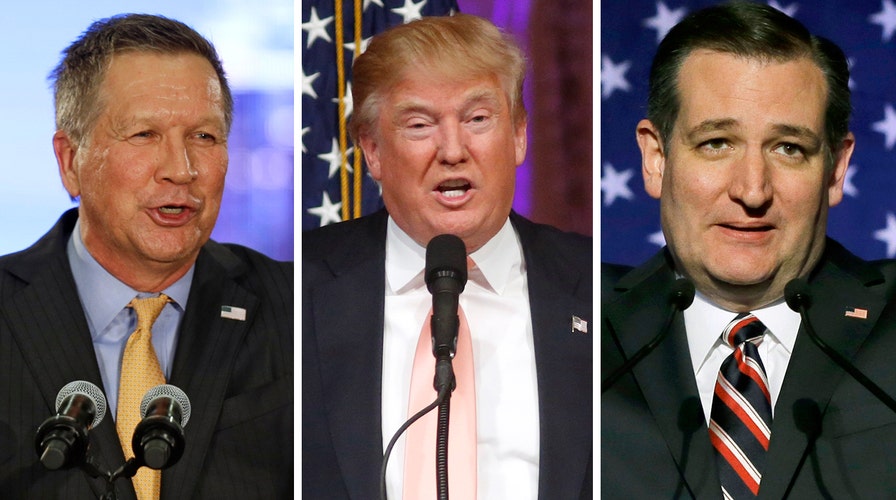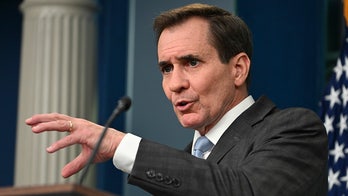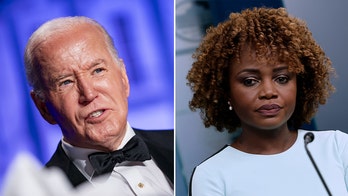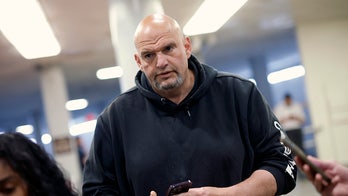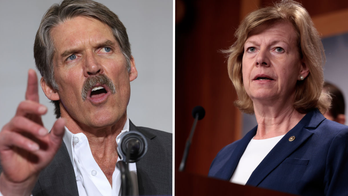Is a contested convention now more likely for the GOP?
Political panel reacts to Super Tuesday II results
Donald Trump revved his already surging momentum with a big string of primary victories Tuesday night, narrowing the field as he expanded his delegate lead – while still facing a challenge from the two remaining competitors.
The Republican front-runner came away from Tuesday’s contests with at least three wins in hand. The biggest prize was Florida, where he defeated Marco Rubio in his home state and knocked him out of the race, pocketing all 99 of the state’s delegates in the process.
He also won primaries in Illinois and North Carolina. The Republican and Democratic primaries in Missouri remained too close to call as of Wednesday morning. With 99 percent of precincts reporting, Trump and Hillary Clinton led by 0.2 percentage points in their respective races.
“We’re going to go forward, and we’re going to win,” Trump told supporters in Palm Beach, Fla. “But more importantly, we’re going to win for the country.”
Yet Ohio Gov. John Kasich vowed to stay in the race, buoyed by a victory in his home state – his first of the race. And Ted Cruz showed no signs of slowing down, leaving it unclear when the raucous GOP primary race might draw to a close.
Meanwhile, Fox News announced Wednesday that the GOP primary debate originally scheduled for Monday in Salt Lake City would be cancelled, after Trump said he would not attend.
Michael Clemente, executive vice president of news, said in a statement:
"On Feb. 20, the Republican National Committee announced that a GOP presidential primary debate would be held on March 21 in Salt Lake City. They offered that debate to Fox News Channel to host, provided there were enough candidates actively campaigning. This morning, Donald Trump announced he would not be participating in the debate. Shortly afterward, John Kasich's campaign announced that without Trump at the debate, Kasich would not participate. Ted Cruz has expressed a willingness to debate Trump or Kasich -- or both. But obviously, there needs to be more than one participant. So the Salt Lake City debate is cancelled.”
On the Democratic side of the race, Clinton further cemented her lead in Tuesday's contests. She defeated Bernie Sanders in the hard-fought Ohio primary, as well as in Illinois, North Carolina and Florida, the last two victories completing her sweep of the Southern state contests.
“This was another Super Tuesday for our campaign,” Clinton said at a victory party in West Palm Beach, Fla., while claiming she is now “very close to winning the Democratic Party nomination.”
Sanders, though, predicted he’d win next week in Arizona, as he rallied supporters during an hour-long speech in Phoenix.
By the end of what was dubbed Super Tuesday II, both Clinton and Trump had further solidified their front-runner status following recent campaign trail hiccups.
But the underdogs saw silver linings all the same.
At a late-night rally in Houston, Cruz said he’d gain delegates out of the day’s contests and suggested Rubio’s exit only crystallizes the choice for voters – between him and Trump.
“Nobody else has any mathematical possibility whatsoever,” Cruz said. “Only one campaign has beaten Donald Trump over and over and over again.”
Yet Ohio Gov. Kasich is not necessarily looking to beat Trump -- not before the convention, anyway.
He had effectively staked his campaign's survival on a victory in his home state, and his win there will deliver him all of the Buckeye State's 66 delegates. Kasich made clear at his election night party in Berea, Ohio, that he will press on, heading next to Pennsylvania and vowing to keep running a positive campaign.
“I will not take the low road to the highest office in the land,” he said. "We are going to go all the way to Cleveland and secure the Republican nomination.”
Even with his Tuesday haul, Kasich remains in fourth place in the GOP delegate count and faces the toughest path to the nomination of the remaining candidates. He has openly said, however, that his hope is to deny Trump the requisite delegates to clinch the nomination before the July convention in Cleveland.
While Kasich presses on, Florida Sen. Rubio suspended his campaign Tuesday after losing his home state convincingly to Trump. He made the announcement to disappointed supporters at a rally in Miami, ending a campaign that began with great promise and recently had picked up support from a wide range of Republican lawmakers. But Rubio trailed in the delegate count, having won only three contests so far.
“It is clear that while we are on the right side this year, we will not be on the winning side,” Rubio told supporters in Miami, adding: “My campaign is suspended.”
Rubio declined to endorse anybody as he suspended his campaign, lamenting what he described as the “politics of resentment.”
“While this may not have been the year for a hopeful and optimistic message about our future, I still remain hopeful and optimistic about America,” Rubio said, in remarks heavy on his personal faith.
For both Kasich and Rubio, a win in their home states was considered critical Tuesday night, as Trump and Cruz have been pressuring both candidates to get out for weeks – hoping Tuesday’s primaries might be the final blow for their underdog bids.
But as Rubio leaves the trail, Kasich could continue to draw delegates and help prevent any candidate from clinching the nomination before the convention. Kasich also said earlier Tuesday that he'll be “forced, going forward, to talk about some of the deep concerns” he has about Trump's campaign.
Tuesday’s balloting constituted one of the most delegate-rich primary days on the calendar to date. There were 691 delegates at stake on the Democratic side, and 367 at stake on the GOP side.
Trump also scored a win Tuesday in the Northern Mariana Islands' GOP caucus, gaining all nine delegates from the U.S. territory.
As of Wednesday morning, Trump had 661 total delegates; Cruz had 406; and Kasich had 142. Rubio left the race with 169.
It takes 1,237 delegates to win the GOP nomination.
